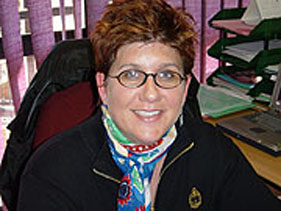Vulnerable Children Threatened by 2010 World Cup says South Africa Fair Trade Tourism Boss

Jennifer Seif
South Africa’s plans to host the 2010 FIFA World Cup have yet to take into account, in any serious manner, the extent to which this massive event poses threats to vulnerable groups, most notably children,” says Jennifer Seif, the Executive Director of Fair Trade in Tourism South Africa (FTTSA).
FTTSA is South Africa’s leading sustainable tourism development and advocacy organization, providing technical assistance to government and the private sector through awareness raising, capacity building and the facilitation of the world’s first – and still only – tourism Fair Trade certification programme.
A study commissioned in 2008 by Molo Songololo, a Cape Town-based child advocacy organization, indicates a number of child risk factors associated with the 2010 FIFA World Cup, including:
• Increased demand for child labour within South Africa, associated with souvenir selling, busking, domestic work in accommodation establishments and accelerated informal trading during the event;
• Increased risks to street children, particularly in host cities Cape Town, Port Elizabeth, Durban and Johannesburg;
• Increased demand for sex work including commercial sexual exploitation of children. This includes 2010 visitors who may inadvertently transact sex with minors (”situational offenders”);
• Risks associated with school closures: many South African children who will be “unattended” during the event will likely flock to Fan Parks where an estimated 20 million fans are expected. Alcohol sales and lack of night transport are risks to children.
• A spike in human trafficking associated with flexible border control intended to make it easy for tourists to enter and exit South Africa during the event. South African children are at risk of being trafficked within or out of South Africa, whereas children from the southern African region are at risk of being trafficked in/via South Africa, which is an internationally recognized trafficking “hot spot”.
“These risk factors are not self-evident,” says Seif. “Although school closures are intended to decrease traffic on South African roads during the event and make matches accessible to South African youth, an unintended consequence is that hundreds of thousands of school children may be more vulnerable to exploitation.”
“The 2010 FIFA World Cup while a huge opportunity for a developing country like South Africa – and one that we cherish – may potentially exacerbate the exploitation of children and women. “
“During the 2006 World Cup in Germany there were concerns of a spike in trafficking. This proved not to be the case, largely due to excellent public awareness and high levels of coordination between law enforcement, NGOs and other groups. This is not yet the case in South Africa, hence our joining with other NGOs for a more integrated strategy to protect children including South African children and children from our neighbouring countries who will undoubtedly flock to the various fan parks that will be set up throughout the country.”
FTTSA, along with leading child protection organisations, has called for an integrated approach to child protection during the FIFA 2010 World Cup. This would include:
• A public awareness campaign stressing the associated risks for children and the need to make protecting children “everyone’s business”;
• Concerted training of law enforcement, volunteers and immigration officials;
• A 24-hour call centre to manage reporting of exploitative behaviour as well as to provide assistance to victims of exploitation. This would entail building the capacity of existing call centres that do not currently operate on a 24-hour and/or national basis;
• Empowering children at risk – so they know their rights and know how/where to report criminal or coercive behaviour.
 United Kingdom
United Kingdom United States
United States Asia Pacific
Asia Pacific












































CLIA expands trade support with expedition event
Qatar Airways adding Manchester flights
Jet2 unveils Samos as new Greek destination for summer 2026
EU entry-exit system delayed again
ATC strike in Greece could disrupt flights this week